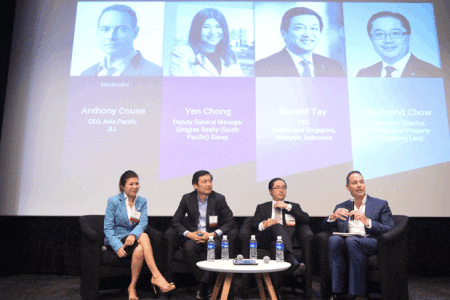Property developers and owners are accelerating the pace of adoption of new technology, introducing new solutions to enhance the customer and tenant experience and to improve operational efficiency. A discussion at the ULI Singapore Annual Conference in February brought together senior executives from leading regional players to discuss their experiences with implementing technology in their organizations.
In 2016, residential property developer Qingjian Realty introduced a “smart home” concept at its Singapore executive condominium project, the Visionaire. Buyers could opt for features such as smart digital locksets that allow residents to lock and unlock their doors remotely via an app, as well as internet cameras that enable them to monitor their homes from outside.
“At that time, we thought maybe not many people will take up the [smart home] units, as the concept was really new in the market,” said Yen Chong, deputy general manager at Qingjian Realty [South Pacific] Group. “To our surprise, 80 percent of the clients took up the smart home packages.” The developer has since introduced smart features in its other developments in the past two years.
CapitaLand, which owns and manages commercial, residential, and retail properties, developed an in-house building management platform about two years ago. That system employs sensors and data analytics to improve the maintenance and energy efficiency of its facilities. As a result, the company has reduced its energy costs by 5 to 10 percent over the past one to two years, said Ronald Tay, chief executive officer of CapitaLand Singapore, Malaysia, Indonesia.
To ensure that it stays abreast of the changes in the technology space, CapitaLand also established a $110 million venture capital fund to invest in startups with the potential to develop disruptive technology in the real estate space. To date, it has invested about 40 percent of the fund.
Hongkong Land has significantly expanded its online retail presence in recent years after recognizing that even luxury shoppers are migrating to e-commerce platforms for their purchases. The company set up a five-member team to explore real estate–related technology applications that could be implemented across its businesses. In particular, it focused on technology that could enhance the customer experience and increase the visibility of its operations.
In-House versus External Talent
The discussion then turned to whether real estate companies should employ in-house talent to drive their digital strategies or outsource the function to specialist providers. The speakers said some combination of the two is needed, with companies requiring a certain degree of in-house capability while also teaming up with external specialists to plug gaps in their expertise.
“We are not a technology company, so we are not going to go big in technology and buy tech startups, for example,” said Tay. “But we will definitely have to work hand in hand with digital or technology specialists or startups. It’s important that we have ownership of our technology so we know exactly what we want to do. Technology may constantly change, but your strategy cannot be changing very year.”
Chow noted that while it is important to forge partnerships in technology, companies must be prepared for the cultural challenge of merging traditional real estate teams with technology professionals or startup entrepreneurs with a different approach to business. “How you get two such teams working effectively together is a challenging management issue,” he said.
Measuring Success
The speakers agreed that is hard to measure the effectiveness of a digital strategy in terms of the traditional dollars-and-cents return on investment. Rather, success should be measured by the “stickiness” of customers and tenants that a technology solution helps achieve.
For example, CapitaLand invested a few million dollars to launch an app called CapitaStar, a rewards program that allows shoppers to earn loyalty points for shopping at the company’s malls. Today, there are close to 1 million CapitaStar members in Singapore, which allows the company to collect and analyze data to enhance the customer experience as well as help tenants better engage with customers. “We are starting to see the payback of that investment in a sense. The stickiness is starting to show,” said Tay.
Tackling Climate Change
The panel session ended with a discussion on how technology can help real estate companies tackle climate change by reducing energy use. Chow said Hongkong Land, as a long-term landlord, ranks energy efficiency and climate change among its top priorities.
Likewise, Capitaland is working with various agencies on adopting new technologies for building materials or structural facilities in order to make its operations more sustainable.
Tay noted the number of technologies available offering energy and cost savings. “All these add up in addressing the [climate] issue at large that is very much evolving, and how we measure the success of engaging technology will be the key at the end of the day,” he said.





